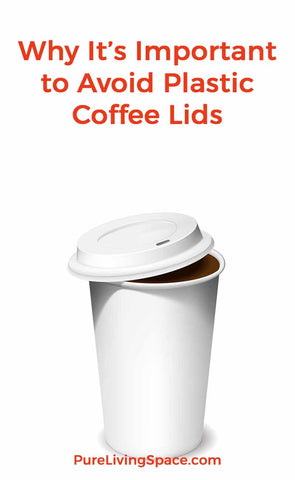
Why It's Important to Avoid Harmful Plastic Coffee Lids
If you're like most people, when you order your morning latte, you don't think about the plastic lid; however, research shows that you probably should. Plastic coffee lids made with #6 or #7 plastic are very likely to contain and release a harmful chemical called BPA.
Is BPA Dangerous?
BPA is a known thyroid and endocrine disruptor. That means that BPA chemicals impair hormone production as well as gene expression.
Worse still, research shows that it doesn't take much to disrupt your hormones. A study showed that even small amounts of BPA can impact your health. These small chemical exposures can add up if you have a daily habit of drinking hot liquids through a plastic lid.
Furthermore, it's not just your hormones being disrupted, according to Dr. Kharrazian, exposure to BPA is particularly troubling for its potential to promote autoimmunity.
How to Know If Your Plastic Lid Contains BPA
How can you tell if your plastic lid contains BPA? Look for the plastic # printed on the lid. Chances are the lid is #6 or #7 plastic and most of those lids contain BPA. Some establishments may use safer plastics, but lids made with #6 or #7 plastic are more common.
Not all #7 plastic contains BPA. In fact, some manufacturers make BPA-free #7 plastic, but unless the manufacturer discloses it, you won't be able to tell the difference because both BPA and BPA-free #7 plastics are identically labeled. Your best bet is to assume it has BPA and try to avoid it.
Why is it Important to Avoid Plastic Lids?
It's important to avoid plastic coffee lids as well as plastic soda and fruit juice bottles. The heat and acidity of the liquid cause high levels of BPA to leach into your drink. This is true of hot drinks as well as cold drinks that are acidic like fruit juice and soda.
Avoid Daily Exposure to BPA
For your health, you should avoid daily exposure to BPA by avoiding drinking hot drinks, juice and soft drinks in plastic containers. Opt to go without the plastic lid or use your own coffee mug. Instead of plastic, buy juices and soda in glass containers.
The health effects of BPA are well-documented, so it makes sense to make some small changes to avoid it.

Learn more about which plastics to avoid and 7 smart plastic alternatives you can't live without.

